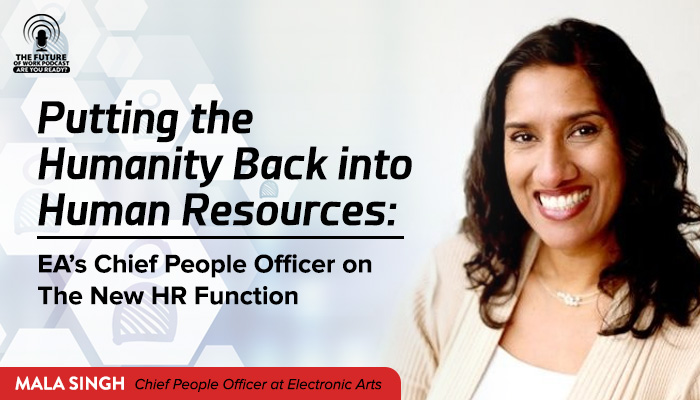Click Here to Subscribe via iTunes
Click Here to Subscribe via RSS Feed (non-iTunes feed)

Mala Singh serves as Chief People Officer for Electronic Arts (EA) where she focuses on developing their talent and cultivating the company culture. In this role, Mala oversees Human Resources, Talent Acquisition, Facilities and Corporate Services.
Prior to this position, Mala spent three years as Chief People Officer at Minted where she helped to define the culture and grow the creative and technical teams during a high-growth period for the startup. Mala began her career in the pharmaceutical industry, serving in Human Resources roles in Asia, Europe and North America.
Founded in 1982, Electronic Arts is a leading global interactive entertainment software company. EA delivers games, content and online services for Internet-connected consoles, personal computers, mobile phones and tablets. Some of their games include Sims, FIFA18, Maden, and Battlefield. Close to 10,000 EA employees are found around the world.
How does EA compete with other organizations for the best talent?
Mala says they don’t compete with Google, LinkedIn and other similar organizations with a focus on compensation – that, she says, “is a race to the bottom.” Instead, they look at supporting their mission system and finding people with a similar focus. They also provide a manager that supports them, surround them with people they admire, have fun with and want to hang out with. In addition, they provide opportunities to learn and grow – providing different experiences. The quality of leadership, learning and growing, this is how they compete. “I refuse to compete on ‘perkage’. How do we care for our people while they are here?” It is based on the quality of the work.
How did the trend towards a focus on mental and physical well being of employee begin?
“We used to think about work/life balance – this a false concept,” Mala says. It is really the idea of managing our whole selves while at work. Also, talented people, the skills in our environments are polarizing. The jobs are becoming more specialized. Because tech is available – those skills and great team members are highly in demand. So in order to compete for the same people, you have to bring a different experience for these people. This is why EA is moving in that direction.
How does learning work at EA?
The general philosophy is that 70% of learning happens through experiences. Then, 20% is through direct coaching from the manager and finally 10% occurs through formal learning. What appears to resonate is just in time smaller snippets of learning that allows people to learn and then use it.
“Diversity of experiences is the lynch pin to everything. When presented the obvious, chose the opposite”. Mala stated that, “Progression comes best from diverse experiences” Apply what you have learned and move to a different setting that you can allow you to apply your skills there.
The mistake often made is that looking at the only way to progress in one’s career is to move from level to level – rather than the gathering of skills. If we can create progression where we gain different skills, then “the best way to get different thinking and innovative approaches is by constantly changing your context and experiences which helps you to become more agile. It teaches you how to adapt, helps you diagnose the situation and figure out solutions. That’s why the diversity of experiences is so fundamental to how people should grow their career.”
What You Will Learn In This Episode:
● What it is like to work at EA
● What the first days are like as a new employee at EA
● What should non-HR people know about HR
● Why tenure is not the metric to track anymore
● Innovations happening in HR at EA
● Why it is futile to compete solely on the basis of compensation
Link from the episode:
Want To Hear More On Human Resources?
The Future Of Talent: Attracting And Retaining The Top Talent For Your Organization
